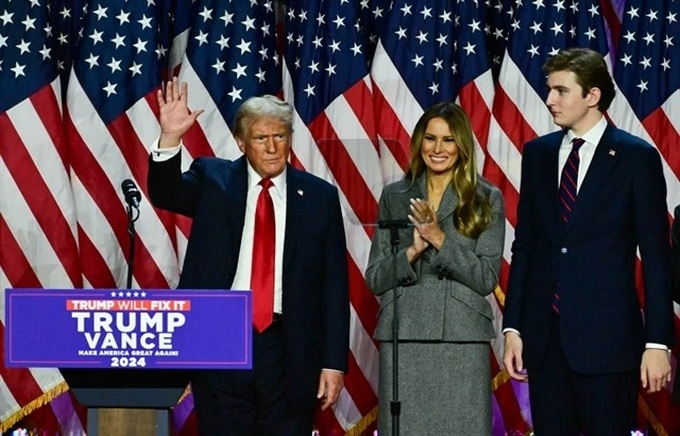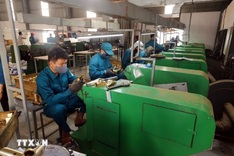
Donald Trump celebrates his US presidential election victory in Florida on November 6, 2024. VinaCapital believes Vietnam should fare reasonably well under the next Trump administration. (Photo: AFP)
With the US presidential election now completed, all eyes have turned to what the new Trump administration will actually do once it takes office in January 2025.
“In many countries around the world, concerns are being raised about the impact of Trump’s election on their economies. However, we believe those risks are overestimated and we see no risk that Trump’s election will derail Vietnam’s healthy economic trajectory for a variety of reasons," said Michael Kokalari, a chartered financial analyst and chief economist at the company.
He noted that first and foremost, the US campaign was rife with outlandish statements and hyperbolic media reporting, leading to overly pessimistic perceptions of a second Trump administration, particularly the economic consequences.
Both presidential candidates vowed to “re-shore” manufacturing jobs back to the US if elected. Trump said he would impose 60% tariffs on imports from China and impose 20-30% tariffs on other countries to achieve that objective.
According to Kokalari, Trump promised high tariffs on the campaign trail because the threat of imposing tariffs (especially on China and Mexico) is powerful campaign rhetoric that appeals to one of Trump’s key constituencies, disaffected blue collar workers, and the 60% figure is probably a bargaining chip for future negotiations with China.
In reality, Trump has a number of accomplished individuals who are advising him on economic issues and they are likely to have more influence over him than those he had during his first administration. They fully understand the negative consequences of imposing overly draconian tariffs on imports to the US. Those negative consequences include preventing re-shoring manufacturing jobs to the US because draconian tariffs would push up the value of the US dollar.
Kokalari noted that inflation was low when Trump imposed tariffs on China, but this time draconian tariffs would exacerbate a major rebound in inflation. Trump has demonstrated that he will not put ideology ahead of economics, making it unlikely that he would actually take actions that would exacerbate inflation, especially given that the main reason he won re-election was voter dissatisfaction with the economy.
Little impact on Vietnam
Trump initiated the US-China trade war and Biden essentially continued it, making it clear that both US political parties view China as a strategic competitor to the US.
In contrast, there is an enthusiastic economic embrace of Vietnam at the highest levels of the US government. “Furthermore, Trump is a populist, and we are not aware of any significant reservations from American consumers to purchase “made in Vietnam” products,” Kokalari said.
Consequently, there’s no reason for Trump to target Vietnam from a populist standpoint. In fact, Vietnam may be viewed as helpful in weening the US off low-end China-made goods because high wages and low availability of qualified factory workers will likely limit US efforts to re-shore manufacturing jobs to only high value-added products, according to Kokalari.
He said: “In short, Vietnam can make things that US consumers want to buy but are too expensive to be made in the US and which Trump would prefer they don’t buy from China.”
However, Vietnam had a circa 100 billion USD trade surplus with the US last year, making it the country with the third-largest trade imbalance with the US after China and Mexico. At some point, this numerical imbalance would become an issue for the Trump administration, he warned.
He pointed out that the issue could be readily addressed by purchasing large-ticket products such as LNG and aircraft engines from the US.
The VinaCapital expert believed Vietnam should fare reasonably well under the next Trump administration.
“While some new US tariffs on imports are possible, we believe it’s very unlikely that the US will impose draconian tariffs (20-30%) on imports from Vietnam,” he said.
Furthermore, if the US were to impose blanket tariffs of, for example, 5-10% on imports from all countries besides China, Vietnam would retain its comparative advantages against other potential competitors for FDI inflows.
Consequently, the qualities that make Vietnam appealing to manufacturers now and that resulted in billions of dollars of FDI flowing into the country should continue.
“That said, Vietnam would be well-served to start looking at how it can reduce its trade surplus with the US before it becomes an issue with the new administration,” Kokalar emphasised./.




















